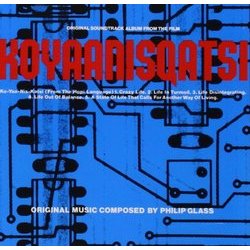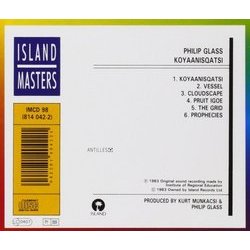Koyaanisqatsi
Subscribe now!
Stay better informed and get access to collectors info!
Stay better informed and get access to collectors info!
| # | Track | Duration | |
|---|---|---|---|
| 1. | Koyaanisqatsi | 3:30 | |
| 2. | Vessel | 8:06 | |
| 3. | Cloudscape | 4:39 | |
| 4. | Pruit Igoe | 7:04 | |
| 5. | The Grid | 14:56 | |
| 6. | Prophecies | 8:11 | |
| 46:25 |
Submit your review
Show reviews in other languages
Koyaanisqatsi is one of those films that people vaguely recall the name of, but rarely know anything about, let alone ever having claimed to having seen it. I was fortunate enough to catch it when it was shown on television at some obscure hour of the night and it's a difficult film to describe. It has no plot, no characters, it isn't really a documentary since there isn't any commentary, but the music and images are meant to show 'A world out of balance.' It starts with images of landscapes, sky and the natural world in the broadest sense, but moves to showing cities, roads streaming with cars, factories and machines working with clinical precision. Almost all of the shots are sped up or slowed down to some extent with hundreds of robots in giant factories repeating the same movements like a giant clockwork. It has quite a hypnotic effect, although the supposed social commentary in regards to humans ruining the planet with machines and civilization is really a little weak and seems to present humanity's impact on the planet as just being one of turning the entire planet into a living machine.
To accompany the pseudo-apocalyptic images is what might be deemed a classic Philip Glass score. Not necessarily classic as music, but it is the epitome of everything people expect from Glass' music. It builds from the smallest ideas that repeat over and over, adding layers of the orchestra, various digital flickering in the background and in many instances a chanting chorus. The hypnotic feel of the film is perfectly synchronised with Glass' style and as such is rightly regarded as a classic fusion of images and music. As the film contains no sound effects (that I recall), the music is perhaps best appreciated as an entirely integral part of the entire enterprise, but the feel of the film is more than adequately mirrored with the soundtrack album alone. As a brief aside, I am listening to the score for this review while also occasionally watching a fair ground across the road. Glass' music is the natural accompaniment for the seemingly endless repetition of each ride's cycling motion; overly poetic perhaps, but eminently suitable.
The opening is very slow burn with a deep chorus intoning the word Koyaanisqatsi, which has a very good natural rhythm to its pronunciation. This is then accompanied by a church organ (or at least a good digital imitation) and gradually the pace picks up with the oscillating arpeggios that are one of Glass' most well known musical trademarks. The length of the tracks means that often the pace resets and so one will build and build, then stop and the next starts from similarly small beginnings before evolving into something equally impressive. Pruit Igoe is one such track. The opening is seems to be leaving the minimalist style behind, but is merely a long phrase repeated, changed and built upon until the chorus once again joins in. Despite listing all the musicians that performed on the score, many of the basic musical units - as it were - are electronic, almost always repeated patterns of arpeggios upon which the acoustic instruments and chorus are overlaid.
The integration of the music and images of Koyaanisqatsi is so paramount to the original production that, unlike many film scores, seeing the music with the film lends it considerably more context than on its own. Glass' music could be considered barren and cold emotionally, indeed its very nature is robotic, although the way the tempo and orchestration go up, the movement from a very rigid structure toward something on the edge of teetering out of control is entirely suitable. There really aren't many musical ideas; almost all of the music contains either repeating arpeggios or chords with or without the chorus, but Glass can take these disparate items and work them into something that is as hypnotic as it is fascinating.
To accompany the pseudo-apocalyptic images is what might be deemed a classic Philip Glass score. Not necessarily classic as music, but it is the epitome of everything people expect from Glass' music. It builds from the smallest ideas that repeat over and over, adding layers of the orchestra, various digital flickering in the background and in many instances a chanting chorus. The hypnotic feel of the film is perfectly synchronised with Glass' style and as such is rightly regarded as a classic fusion of images and music. As the film contains no sound effects (that I recall), the music is perhaps best appreciated as an entirely integral part of the entire enterprise, but the feel of the film is more than adequately mirrored with the soundtrack album alone. As a brief aside, I am listening to the score for this review while also occasionally watching a fair ground across the road. Glass' music is the natural accompaniment for the seemingly endless repetition of each ride's cycling motion; overly poetic perhaps, but eminently suitable.
The opening is very slow burn with a deep chorus intoning the word Koyaanisqatsi, which has a very good natural rhythm to its pronunciation. This is then accompanied by a church organ (or at least a good digital imitation) and gradually the pace picks up with the oscillating arpeggios that are one of Glass' most well known musical trademarks. The length of the tracks means that often the pace resets and so one will build and build, then stop and the next starts from similarly small beginnings before evolving into something equally impressive. Pruit Igoe is one such track. The opening is seems to be leaving the minimalist style behind, but is merely a long phrase repeated, changed and built upon until the chorus once again joins in. Despite listing all the musicians that performed on the score, many of the basic musical units - as it were - are electronic, almost always repeated patterns of arpeggios upon which the acoustic instruments and chorus are overlaid.
The integration of the music and images of Koyaanisqatsi is so paramount to the original production that, unlike many film scores, seeing the music with the film lends it considerably more context than on its own. Glass' music could be considered barren and cold emotionally, indeed its very nature is robotic, although the way the tempo and orchestration go up, the movement from a very rigid structure toward something on the edge of teetering out of control is entirely suitable. There really aren't many musical ideas; almost all of the music contains either repeating arpeggios or chords with or without the chorus, but Glass can take these disparate items and work them into something that is as hypnotic as it is fascinating.
Trailer:
Soundtracks from the collection: The Qatsi Trilogy












